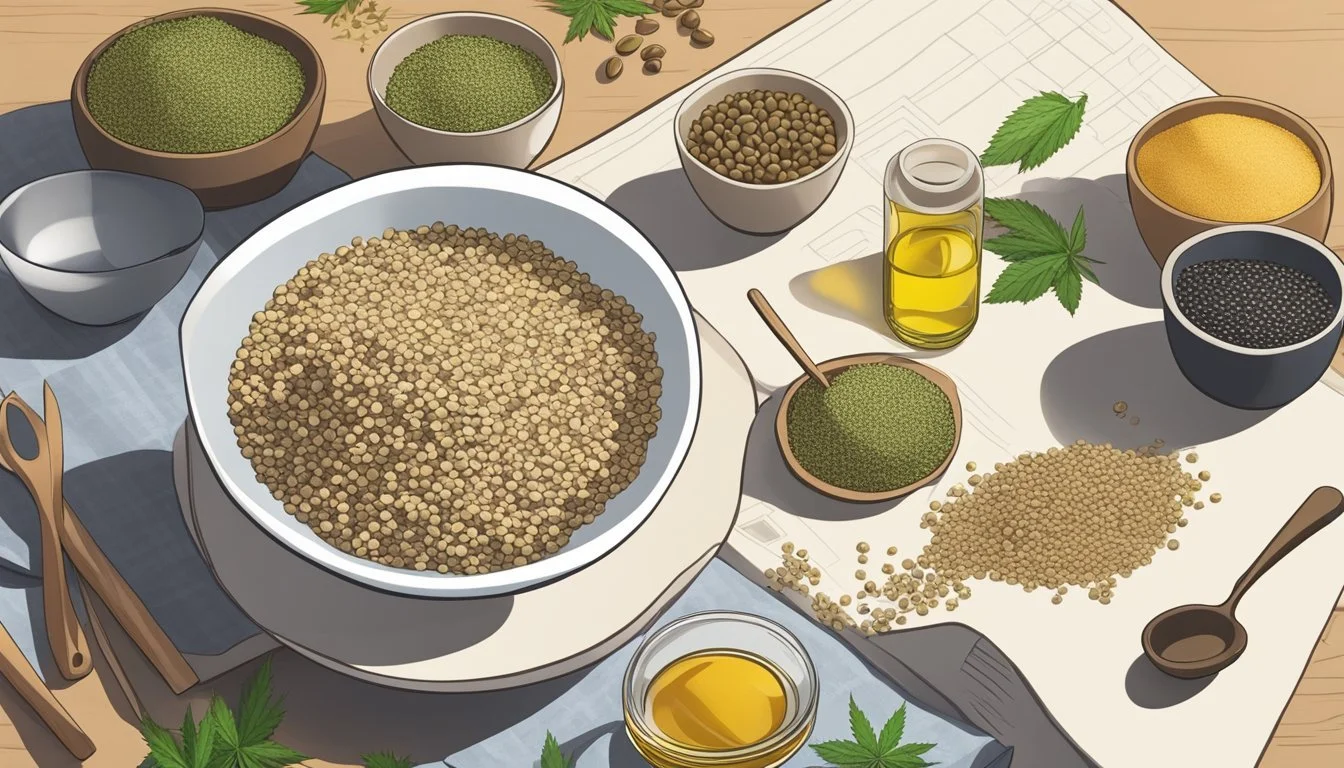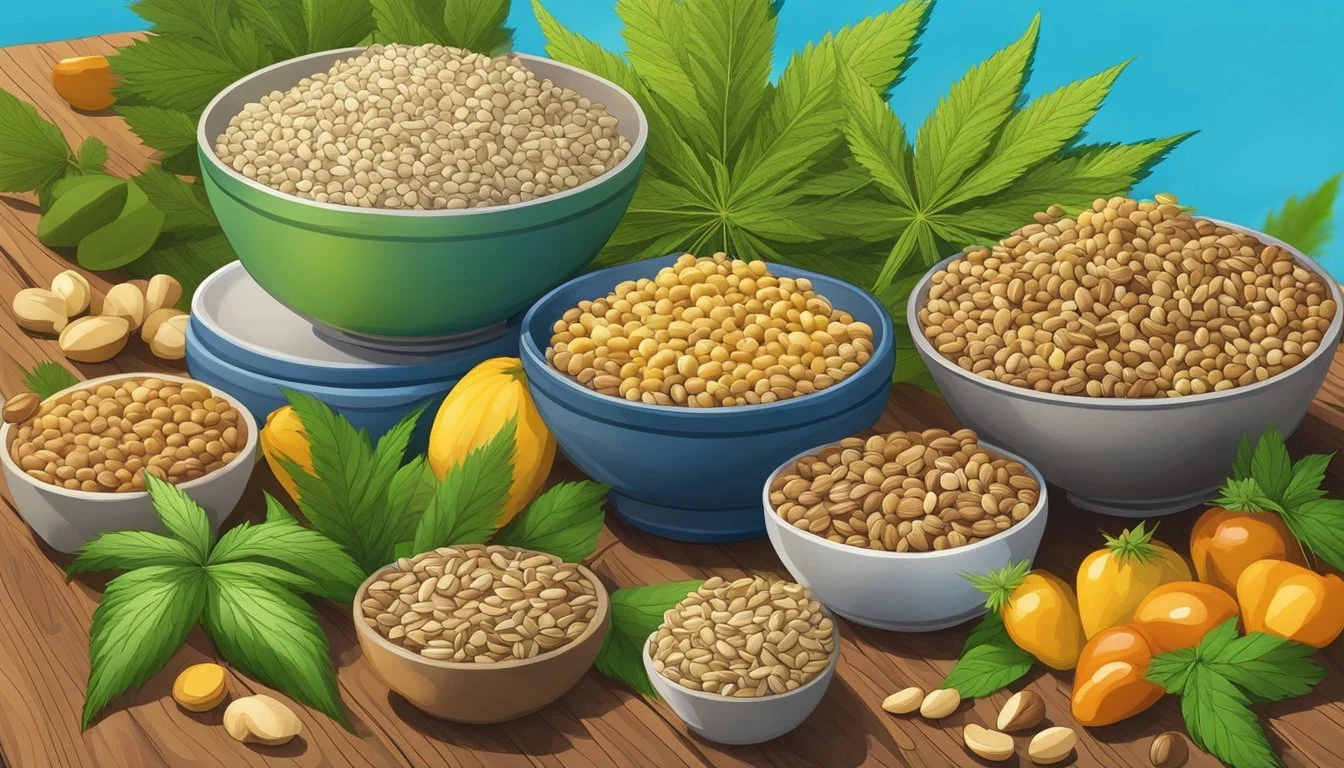Hemp Seeds
The Nutritional Powerhouse Gains Mainstream Recognition
Hemp seeds, the small but mighty edibles extracted from the Cannabis sativa plant, have seen a surge in popularity as a superfood in recent years. Known for their high nutritional value, these seeds, often referred to as hemp hearts when shelled, provide a plethora of health benefits. Rich in protein, hemp seeds are one of the few plant-based sources that offer all nine essential amino acids, making them a complete protein source ideal for vegetarians and vegans.
These tiny powerhouses are not just protein wonders; they also contain a balance of essential fatty acids. Omega-3 and omega-6 fatty acids are abundant in hemp hearts, supporting heart health and contributing to strong immune and inflammatory responses. This profile has made hemp seed oil a sought-after ingredient for those looking to augment their diet with healthy fats.
In addition to their macronutrient content, hemp seeds deliver a variety of minerals and vitamins. They are a good source of fiber, which can assist in appetite control and blood sugar stabilization, as well as promote digestive health. The presence of minerals such as magnesium, phosphorus, and potassium adds to their nutrition-focused appeal. As hemp products like oil, milk, cheese, and protein powders proliferate into the market, the versatility and benefits of hemp seeds cement their status as a nutritional powerhouse.
Hemp Seeds Nutritional Profile
Hemp seeds boast a comprehensive nutritional profile that includes high-quality proteins, a balance of essential fatty acids, and a rich supply of vitamins and minerals.
Proteins and Amino Acids
The protein content in hemp seeds is significant, with about 10 grams per three tablespoons. They provide a complete protein source, meaning that they contain all nine essential amino acids necessary for human health. This is particularly noteworthy for plant-based proteins, as few plant sources offer complete amino acid profiles.
Complete Protein: Contains all nine essential amino acids.
Fatty Acids and Healthy Fats
Hemp seeds are a rich source of essential fatty acids, containing an ideal omega-6 to omega-3 ratio of approximately 3:1. One serving can offer 2.79 grams of omega-3 in the form of alpha-linolenic acid (ALA) and a substantial amount of gamma-linolenic acid (GLA), both recognized for their anti-inflammatory properties. Additionally, the seeds are an excellent source of polyunsaturated fats and maintain overall cardiovascular health.
Omega-3: Alpha-linolenic acid (ALA) - for heart and brain health.
Omega-6: Including GLA - known for anti-inflammatory effects.
Vitamins and Minerals
Rich in minerals, hemp seeds contain magnesium, phosphorus, iron, and zinc, among others, which play critical roles in bone health, oxygen transport, and immune function. The vitamin content is also noteworthy, with hemp seeds providing vitamins A, B, C, and E. These vitamins serve roles from antioxidant protection to maintaining skin and vision health.
Magnesium: Essential for many body processes, including nerve function.
Iron: Vital for hemoglobin formation and oxygen transport in the body.
By including hemp seeds in the diet, one can derive a broad spectrum of nutritional benefits from their substantial protein, healthy fats, and essential vitamins and minerals.
Health Benefits of Hemp Seeds
Hemp seeds are a highly nutritious food that provide a myriad of health benefits. They are particularly known for their healthy fats, including omega-3 fatty acids, which are beneficial for heart health, skin conditions, and inflammation, as well as their high fiber content that supports digestive health.
Heart and Cardiovascular Health
Hemp seeds are an excellent source of essential fatty acids, including omega-3 fatty acids, which play a crucial role in heart health. These fats can help to:
Maintain normal blood pressure levels
Reduce the risk of heart disease
Improve cholesterol profiles by increasing HDL (good cholesterol) and decreasing LDL (bad cholesterol)
Skin Health and Conditions
The nutritional profile of hemp seeds, particularly the gamma-linolenic acid (GLA) and omega-3s, supports healthy skin. These compounds can:
Aid in reducing the symptoms of eczema and other skin conditions
Strengthen the skin's barrier, helping to protect against environmental damage
Promote a healthy immune system response, potentially reducing inflammation-related skin issues
Digestive System Support
Hemp seeds are a great addition to the diet for those looking to support their digestive health. They contain:
High levels of fiber, which can aid in preventing constipation and maintaining a healthy digestive tract
Insoluble and soluble fiber, assisting both bulk formation and softening of stools, thereby promoting regular metabolism
Anti-inflammatory Properties
Hemp seeds possess notable anti-inflammatory properties due to the presence of GLA, which may have a beneficial impact on various inflammatory conditions. Additionally, they offer:
Antioxidants, which can protect cells from oxidative stress
Nutrients that may support brain function and overall reduction in systemic inflammation
Hemp Seeds in Diet and Cooking
Hemp seeds are a versatile ingredient that can be seamlessly incorporated into various meals, offering a rich, nutty flavor and a boost of nutrition. They fit perfectly into a health-conscious diet, finding their place in an array of culinary preparations.
Incorporating Hemp Seeds into Meals
Hemp seeds offer an easy way to enrich the nutritional profile of everyday foods. Sprinkling shelled hemp seeds, also known as hemp hearts, on top of salads or blending them into smoothies are straightforward methods to incorporate them into a diet. For breakfast, one might add a spoonful of hemp seeds to oatmeal or yogurt to enhance the meal's texture and nutrient content. In the realm of baked goods, adding a quarter cup of these seeds to bread or muffin recipes can ensure an even distribution, complementing the other ingredients and enriching the final product with their nutty taste.
Salads: Sprinkle hemp seeds on top for a nutritional boost.
Smoothies: Blend in a tablespoon of hemp seeds for added texture and health benefits.
Oatmeal: Mix in hemp seeds to start the day with a satisfying and hearty breakfast.
Yogurt: Add hemp seeds to yogurt to provide a crunchy contrast.
Baked Goods: Fold hemp seeds into the batter for a slightly nutty flavor and nutritional enhancement.
Hemp Seed Products
The market offers a variety of hemp seed-based products, catering to diverse dietary preferences and uses. Hemp milk, made by blending water with hemp seeds, is a dairy-free milk alternative with a creamy consistency, suitable for vegan diets or those with lactose intolerance. Hemp seed oil is another derivative, which can be used in dressings or drizzled over finished dishes, adding a subtle nutty essence. It's important to note that although hemp seed oil is nutritious, it is not recommended for frying due to its low smoke point but is excellent for cold dishes.
Hemp Milk: Dairy-free and creamy, used as an alternative to traditional milk.
Hemp Seed Oil: Ideal for dressings and adding a nutty finish to dishes; not suitable for high-temperature cooking.
Understanding Hemp: Beyond Nutrition
While hemp seeds boast significant nutritional benefits, their relationship to marijuana and their use in cuisine are often misunderstood. The following subsections provide clarity on these topics.
Hemp Seeds vs. Marijuana
Cannabis Sativa is the plant species that encompasses both hemp and marijuana; however, the distinguishing factor lies in the concentration of THC (tetrahydrocannabinol), the psychoactive component. Hemp seeds come from the hemp plant, which is cultivated specifically to have only trace amounts of THC, typically less than 0.3%. This minuscule level does not produce any psychoactive effects when consumed. On the other hand, marijuana contains higher levels of THC and is utilized for its mind-altering properties.
Culinary Use and Flavor Profile
In the culinary world, hemp seeds are hailed for their nutty flavor and versatility. They can be sprinkled over salads, blended into smoothies, or incorporated into baked goods—adding a crunchy texture and a boost of nutrients. Chefs and home cooks alike appreciate the rich, earthy taste that hemp seeds lend to dishes, enhancing flavor profiles without overpowering other ingredients.
Practical Tips for Consumers
When incorporating hemp seeds into their diet, consumers should be aware of the best practices for selection, storage, and daily consumption to maximize their nutritional benefits.
Selecting and Storing Hemp Seeds
Consumers can choose from whole, hulled, or shelled hemp seeds. Whole hemp seeds contain the outer husk and are high in fiber, while hulled or shelled hemp seeds, also known as hemp hearts, have the husk removed, providing a more concentrated source of nutrients with a softer texture.
To ensure freshness, consumers should look for hemp seeds that are:
Sold in airtight packaging
Free from any signs of moisture or rancidity
Labeled with a "best by" date to gauge freshness
Storage is crucial for maintaining the quality of hemp seeds:
Store hemp seeds in a cool, dark place if they will be used soon.
For long-term storage, keep them in an airtight container in the refrigerator or freezer, which can extend their shelf life significantly.
Recommended Daily Intake
While hemp seeds are nutritious, it is important to consume them in moderation. A standard daily serving size for hemp seeds is typically around 2 to 3 tablespoons. This amount ensures that individuals can reap the nutritional benefits without excessive calorie intake. Here's a simple guide to the daily intake of hemp seeds:
Serving Size: 2-3 Tbsp
Hemp Seed Type: Whole, Hulled, Shelled
Method of Consumption: Sprinkled on salads, blended in smoothies, mixed into yogurt, or used in baking
It is always advisable for individuals to consult with a healthcare provider to determine their specific nutritional needs, especially when making significant dietary changes.
Challenges and Considerations
While hemp seeds are recognized for their significant nutritional value and health benefits, certain challenges and considerations need to be acknowledged when including them in a diet.
Potential Allergies and Interactions
Hemp seeds, like any other food ingredient, can cause allergic reactions in some individuals. Symptoms may include skin rashes, itchy throat, and gastrointestinal discomfort. Although uncommon, allergies should be taken seriously, and individuals with a history of plant-based allergies should be cautious. It’s also important to consider potential interactions with medications, as hemp seeds contain compounds that can affect drug metabolism.
Symptoms of hemp seed allergy:
Itchy throat
Skin rash
Gastrointestinal discomfort
Considerations for medication interactions:
Check with healthcare providers
Monitor for side effects
Environmental Impact and Sustainability
Hemp cultivation poses its own environmental challenges, but it is often lauded for its sustainability benefits. Hemp plants require minimal water, compared to many other crops, and can grow in a wide range of climates. They also naturally replenish soil nutrients, reducing the need for chemical fertilizers. However, the increase in hemp production globally must still consider the environmental impact of large-scale agriculture, including resource use and potential pesticide application.
Hemp's sustainability benefits:
Low water requirements
Soil nutrient replenishment
Considerations for large-scale production:
Resource management
Potential for pesticide use
Conclusion
Hemp seeds are emerging as a recognized superfood, providing a rich source of nutrition that dietitians and health-conscious individuals are incorporating into daily diets. These small seeds offer a considerable nutritional advantage with their high protein content, including all nine essential amino acids, qualifying them as a complete protein source.
Rich in omega-3 and omega-6 fatty acids, hemp seeds support heart health and may contribute to a balanced diet. The optimal ratio of these fatty acids in hemp seeds is a notable aspect, aligning with recommendations by registered dietitians for a healthy fat intake.
Fiber: Their high fiber content makes hemp seeds an ally in digestive health and satiety.
Versatility: They can be easily integrated into various recipes, increasing their appeal in the culinary world.
In terms of usage, they're not only beneficial when eaten as whole seeds but also when consumed as derivatives like hemp seed oil, protein powder, and hemp milk. Each derivative retains considerable nutritional properties, making hemp seeds versatile.
Recognized for their nutritional benefits, hemp seeds are becoming a staple in the pantries of those looking for nutrient-dense, plant-based foods. They stand out as a natural, unprocessed food that supports a healthy lifestyle.
Their increasing popularity is a testament to their nutritional value and potential health benefits. Hemp seeds are indeed carving a notable position in the realm of health foods and sustainable nutrition sources.






